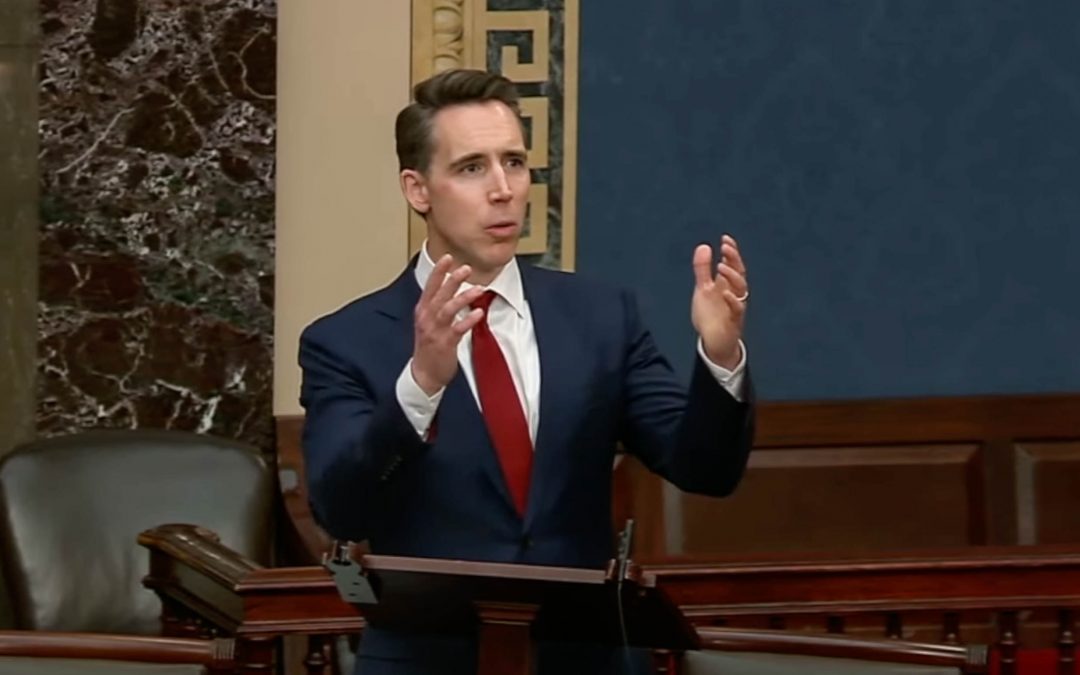WASHINGTON – After unsuccessful efforts to include Missouri residents in a decades-old law that compensates victims of radiation from nuclear weapons development, Missouri Sen. Josh Hawley succeeded last week in getting the Senate to pass an expansion.
The Senate also extended coverage of the law for five years, as the 2022 law was set to expire this spring. The House has yet to act and would have to before Missouri residents could benefit.
Sen. Josh Hawley (R-Mo.) has previously struggled to gain support to expand this law to cover victims in more states, including Missouri. In July 2023, the Senate added his amendment to the law funding the Department of Defense in 2024, but his amendment was axed from the final version of the law in December.
As Hawley faces reelection in November, his support for victims of radiation exposures stands out as a rare public health and environmental initiative for the conservative Republican. He’s better known as the first senator to declare he would formally challenge the 2020 presidential results. Hawley’s support for the radiation exposure victims has won him some fans among Missouri activists, but other people criticize the senator for reportedly taking campaign contributions from known polluters in the area.
Political analysts say that even though Republicans rarely champion environmental causes, they make exceptions when their own constituents are suffering.
“This is a common thing, especially for people who have elections coming up, to try to help their local constituents even though he’s philosophically pretty conservative,” founder and former director of American University’s Center for Congressional and Presidential Studies James Thurber said. “All politics is local, this is an example of it, where he is trying to help his constituents.”
Hawley sent an email to Republican colleagues in the Senate in late February urging their support to expand and extend the law before its funding expires. He also announced Monday that longtime Missouri advocate for radiation exposure victims Dawn Chapman would join him at the State of the Union address, which President Biden delivered Thursday night.
“If we can send hundreds of billions of dollars in security assistance to foreign nations, we can spend a fraction of that on our own constituents who deserve help,” Hawley said in the email.
The Radiation Exposure Compensation Act of 1990 provides money to individuals negatively affected by radiation exposure from Cold War era nuclear weapons testing and uranium mining. In 12 states, former uranium industry workers or individuals from communities downwind of testing sites who contracted specified illnesses can receive financial packages through the Department of Justice. Individuals in Missouri have not been eligible for compensation under the act’s previous criteria.
Pharmaceutical company Mallinckrodt processed uranium for nuclear weapons in the 1940s and 1950s as part of the Manhattan Project. Radioactive waste then contaminated the nearby waters and was mixed with landfill materials during clean-up processes in the 1980s, according to the Missouri Coalition for the Environment. A combined investigation of the Missouri Independent, MuckRock, and the Associated Press referenced a federal study that found elevated rates of cancers in St. Louis County. The Coldwater Creek in St. Louis County was contaminated with radioactive materials and will not be clean for many years, according to the report.
Christen Commuso grew up in St. Louis with her family. After nearly a decade advocating for nuclear waste cleanup and compensation for victims through organizations like Just Moms STL and the Missouri Coalition for the Environment, Commuso said the push to get compensation and clean-up in her community has never been stronger, especially in Congress.
“We do have support, but I will say that Hawley has definitely… become the champion of this,” Commuso said. “It seems like he’s been the one pushing, at least for [the reauthorization act], the most.”
Despite this, Commuso said St. Louis residents were disappointed after the defense bill excluded the expanded version of the compensation act in December.
“I think for the first time, we were very hopeful, and I think a lot of the members of the community were very hopeful that something was going to happen,” Commuso said.
But Hawley’s critics said that the senator does not deserve praise on the issue because of actions he took as Missouri’s Attorney General from 2017 to 2019. Once elected, Hawley removed the environmental division from the office, but he said the entire office was restructured, according to the Missouri Independent. The report also mentioned Hawley previously accepted campaign donations from Mallinckrodt and other companies involved in nuclear waste processing or cleanup.
“This is the exact thing that everybody talks about everywhere we go, big corporations buying off our politicians,” Lucas Kunce said, one of four Democratic candidates running against Hawley in November. “That’s Josh Hawley, That’s exactly what happened here, and we have to do something about it.”
Thurber said in a red state like Missouri, Hawley’s reelection bid may not be impacted by his record of receiving campaign contributions from polluters.
“Whether that would swing enough votes in Missouri is questionable, because it’s such a conservative place,” Thurber said. “It may not have an effect at all.”
Sen. Hawley and his staff did not provide interviews despite several email requests.
After the Senate voted last week, Hawley explained the need to provide compensation for victims in his state.
“This isn’t about a handout. This isn’t about some kind of welfare program,” Hawley said in a press release. “This is about doing basic justice by the working people of this nation, whom their own government has poisoned.”

